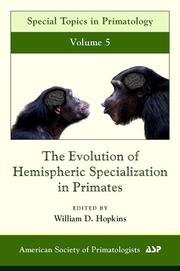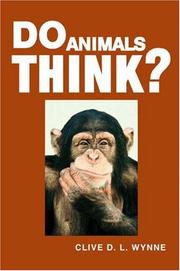| Listing 1 - 10 of 594 | << page >> |
Sort by
|
Periodical
ISSN: 18836283 Year: 1990 Publisher: Tōkyō-to : Dō Gakkai,
Abstract | Keywords | Export | Availability | Bookmark
 Loading...
Loading...Choose an application
- Reference Manager
- EndNote
- RefWorks (Direct export to RefWorks)
Dissertation
ISBN: 916286856X Year: 2006 Publisher: Göteborg Göteborg University. Department of psychology
Abstract | Keywords | Export | Availability | Bookmark
 Loading...
Loading...Choose an application
- Reference Manager
- EndNote
- RefWorks (Direct export to RefWorks)
Book
ISBN: 3540076069 Year: 1976 Publisher: Berlin Springer
Abstract | Keywords | Export | Availability | Bookmark
 Loading...
Loading...Choose an application
- Reference Manager
- EndNote
- RefWorks (Direct export to RefWorks)
Book
ISBN: 3540096671 Year: 1980 Publisher: Berlin Springer
Abstract | Keywords | Export | Availability | Bookmark
 Loading...
Loading...Choose an application
- Reference Manager
- EndNote
- RefWorks (Direct export to RefWorks)
Multi
ISBN: 9783031074141 9783031074134 9783031074158 9783031074165 Year: 2022 Publisher: Cham Springer International Publishing :Imprint: Palgrave Macmillan
Abstract | Keywords | Export | Availability | Bookmark
 Loading...
Loading...Choose an application
- Reference Manager
- EndNote
- RefWorks (Direct export to RefWorks)
This book deals with the theme of creativity in the animal world, conceived as a basic function for adapting to specific situations and as a source of innovations and inventions. Creativity is a fundamental resource for the individual who always has a leading role in conduct. To explain creativity, the book focuses on the concept of animal subjectivity, providing a new explanatory model of behavior capable of overcoming the image of the animal moved by automatisms. This model does not use consciousness as a necessary condition, but is based: 1) on affective components, such as behavioral motives, and 2) cognitive, as tools used by the subject to carry out his purposes. Particular attention is paid to the learning processes showing the subjective character of the experience. One topic addressed is the role of creativity in the evolution of living beings: how an invention, by modifying the niche characteristics, is able to change the selective pressures and the trajectory of phylogeny. Roberto Marchesini explains that creativity is a factor that is anything but rare or exceptional in the animal world-it constitutes a fundamental quality for many aspects of animal life.
Ethnology. Cultural anthropology --- etnologie --- Animal psychology.
Multi
ISBN: 9780124076549 0124076548 1306213029 9781306213028 0124072283 9780124072282 Year: 2014 Publisher: London : Academic Press,
Abstract | Keywords | Export | Availability | Bookmark
 Loading...
Loading...Choose an application
- Reference Manager
- EndNote
- RefWorks (Direct export to RefWorks)
The classic literature on predation dealt almost exclusively with solitary predators and their prey. Going back to Lotka-Volterra and optimal foraging theory, the theory about predation, including predator-prey population dynamics, was developed for solitary species. Various consequences of sociality for predators have been considered only recently. Similarly, while it was long recognized that prey species can benefit from living in groups, research on the adaptive value of sociality for prey species mostly emerged in the 1970's. The main theme of this book is the various ways that predators
Animal psychology and neurophysiology --- Predation (Biology) --- Animal communities.

ISBN: 9780123741974 0123741971 9780080557809 0080557805 128176244X 9781281762443 9786611762445 Year: 2007 Publisher: London, UK ; Burlington, MA : Academic Press,
Abstract | Keywords | Export | Availability | Bookmark
 Loading...
Loading...Choose an application
- Reference Manager
- EndNote
- RefWorks (Direct export to RefWorks)
Hemispheric specialization, and lateralized sensory, cognitive or motor function of the left and right halves of the brain, commonly manifests in humans as right-handedness and left hemisphere specialization of language functions. Historically, this has been considered a hallmark of, and unique to, human evolution. Some theories propose that human right-handedness evolved in the context of language and speech while others that it was a product of the increasing motor demands associated with feeding or tool-use. In the past 20-25 years, there has been a plethora of research in animals on the
Animal psychology and neurophysiology --- Cerebral dominance --- Primates --- Physiology.

ISBN: 0898591570 Year: 1981 Publisher: Hillsdale Erlbaum
Abstract | Keywords | Export | Availability | Bookmark
 Loading...
Loading...Choose an application
- Reference Manager
- EndNote
- RefWorks (Direct export to RefWorks)
Animal psychology --- Conditioned response --- Memory --- Congresses --- Congresses --- Congresses

ISBN: 0691126364 1306046157 0691113114 1400849551 9780691126364 9781400849550 Year: 2013 Publisher: Princeton, NJ
Abstract | Keywords | Export | Availability | Bookmark
 Loading...
Loading...Choose an application
- Reference Manager
- EndNote
- RefWorks (Direct export to RefWorks)
Does your dog know when you've had a bad day? Can your cat tell that the coffee pot you left on might start a fire? Could a chimpanzee be trained to program your computer? In this provocative book, noted animal expert Clive Wynne debunks some commonly held notions about our furry friends. It may be romantic to ascribe human qualities to critters, he argues, but it's not very realistic. While animals are by no means dumb, they don't think the same way we do. Contrary to what many popular television shows would have us believe, animals have neither the "theory-of-mind" capabilities that humans have (that is, they are not conscious of what others are thinking) nor the capacity for higher-level reasoning. So, in Wynne's view, when Fido greets your arrival by nudging your leg, he's more apt to be asking for dinner than commiserating with your job stress. That's not to say that animals don't possess remarkable abilities--and Do Animals Think? explores countless examples: there's the honeybee, which not only remembers where it found food but communicates this information to its hivemates through an elaborate dance. And how about the sonar-guided bat, which locates flying insects in the dark of night and devours lunch on the wing? Engagingly written, Do Animals Think? takes aim at the work of such renowned animal rights advocates as Peter Singer and Jane Goodall for falsely humanizing animals. Far from impoverishing our view of the animal kingdom, however, it underscores how the world is richer for having such a diversity of minds--be they of the animal or human variety.
Animal intelligence. --- Consciousness in animals. --- Animal consciousness --- Intellect of animals --- Intelligence of animals --- Animal psychology --- Instinct --- Psychology, Comparative --- Cognitive psychology --- Animal psychology and neurophysiology
Book
ISBN: 1108616526 1108576575 1108727468 Year: 2020 Publisher: Cambridge : Cambridge University Press,
Abstract | Keywords | Export | Availability | Bookmark
 Loading...
Loading...Choose an application
- Reference Manager
- EndNote
- RefWorks (Direct export to RefWorks)
Comparative psychology, the multidisciplinary study of animal behavior and psychology, confronts the challenge of how to study animals we find cute and easy to anthropomorphize, and animals we find odd and easy to objectify, without letting these biases negatively impact the science. In this Element, Kristin Andrews identifies and critically examines the principles of comparative psychology and shows how they can introduce other biases by objectifying animal subjects and encouraging scientists to remain detached. Andrews outlines the scientific benefits of treating animals as sentient research participants who come from their own social contexts and with whom we will be in relationship. With discussions of science's quest for objectivity, worries about romantic and killjoy theories, and debates about chimpanzee cognition between primatologists who work in the field and those in the lab, Andrews shows how scientists can address the different biases through greater integration of the subdisciplines of comparative psychology.
Cognition in animals. --- Animal behavior. --- Animal psychology. --- Animals --- Psychology --- Psychology, Comparative --- Animals, Habits and behavior of --- Behavior, Animal --- Ethology --- Animal psychology --- Zoology --- Ethologists --- Animal cognition --- Animal intelligence --- Behavior
| Listing 1 - 10 of 594 | << page >> |
Sort by
|

 Search
Search Feedback
Feedback About UniCat
About UniCat  Help
Help News
News